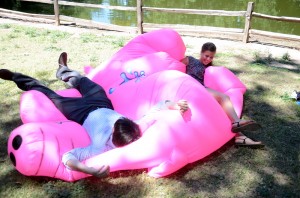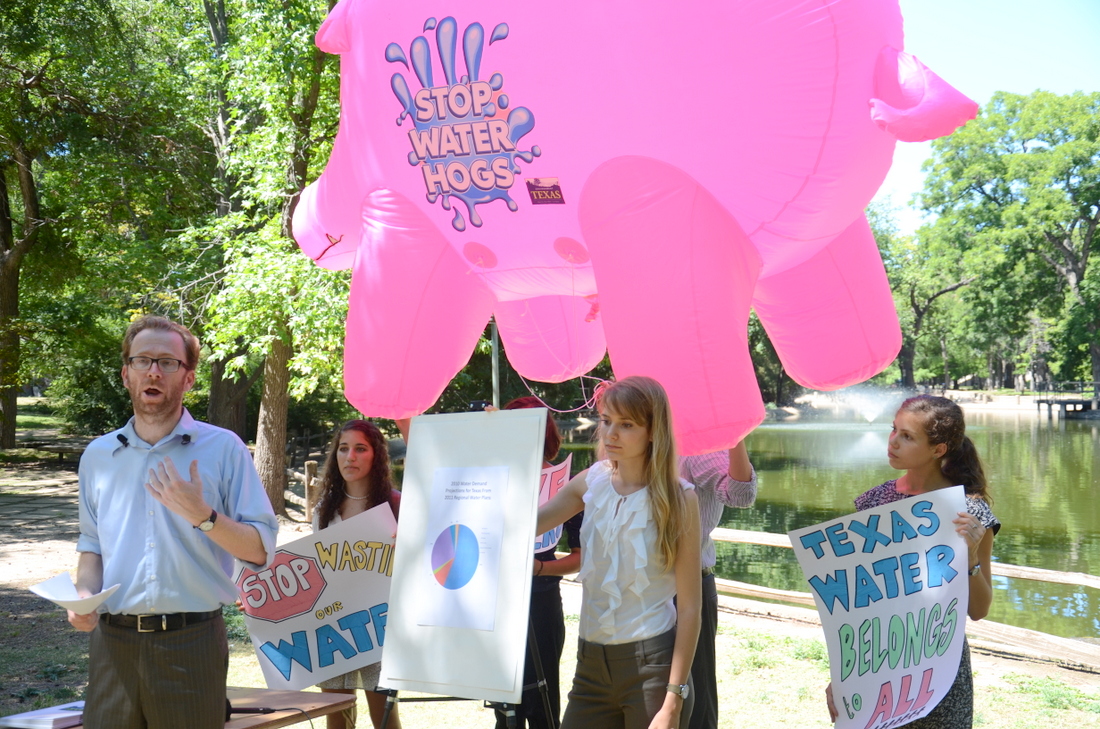The journalists almost outnumbered the handful of activists at a Wednesday press conference on water conservation organized by Austin-based Environment Texas.
Four local news stations covered the event at Trinity Park’s duck pond and — let’s face it — probably wouldn’t have showed up at all without the inflated, Volkswagen-sized “water hog” held aloft by a shaggy-haired intern.
That isn’t a criticism. Obviously the group knows how to draw media attention. A basic plan runs on roughly the same principle as persuading a recalcitrant child to go to the doctor: lure them in with something colorful and potentially edible. I’ve never seen a hot-pink publicity stunt fail yet.
And for the group’s director, Luke Metzger, who did most of the talking, the pig also serves as an apt metaphor for a state that has long tolerated extravagant and needless water consumption, especially in the sprawling, booming metropolis of Dallas-Fort Worth, where tree-hugger bumper stickers are likely outnumbered by slogans like “Save Water, Drink Beer.”
“Nobody should be allowed to waste water,” Metzger said. “But even after the worst drought in history, water hogs are busy wasting our water and jeopardizing our future. We need the Legislature to adopt tough standards to save water and fund critical water conservation programs.”
Cowtown City Council has already argued over what exactly constitutes a “water hog.”
“We are water hogs. That term is out there,” said Jim Oliver, general manager of the Tarrant Regional Water District, in a May council meeting. “We do waste a lot of water.”
Such discussions have been triggered most recently by a push from the mayors of Dallas, Fort Worth and Arlington to approve permanent water restrictions that would limit only automatic sprinklers and hose-end sprinklers. Dallas’ city council already passed such restrictions, while Fort Worth will take up the issue some time this summer.
Arlington’s city council was expected to approve the restrictions, but then killed the motion after several residents lambasted the idea as “un-American.”
Asked about such resistance, Metzger’s response was measured.
“We all need to do our part,” he said. “Municipal water use is the highest. We are looking at a future

water shortage.”
Metzger and his pack of interns, or “intern squad”, as they called themselves, were all from Austin. Metzger and at least a few others plan on ferrying their porcine zeppelin to Austin and San Antonio, which would both rank high on any list of conservation-conscious cities.
The only Fort Worthian to let off some steam on water wasters was Linda Hanratty of the League of Women Voters of Texas.
“Water conversation should be mandatory, with adequate citizen education for effective water stewardship,” Hanratty wrote in a news release.
In person, she was quick to point out that despite recent rains, Texans should not forget how quickly the scorching heat of 2011 can return.
“That weather could happen again quickly,” she said.











